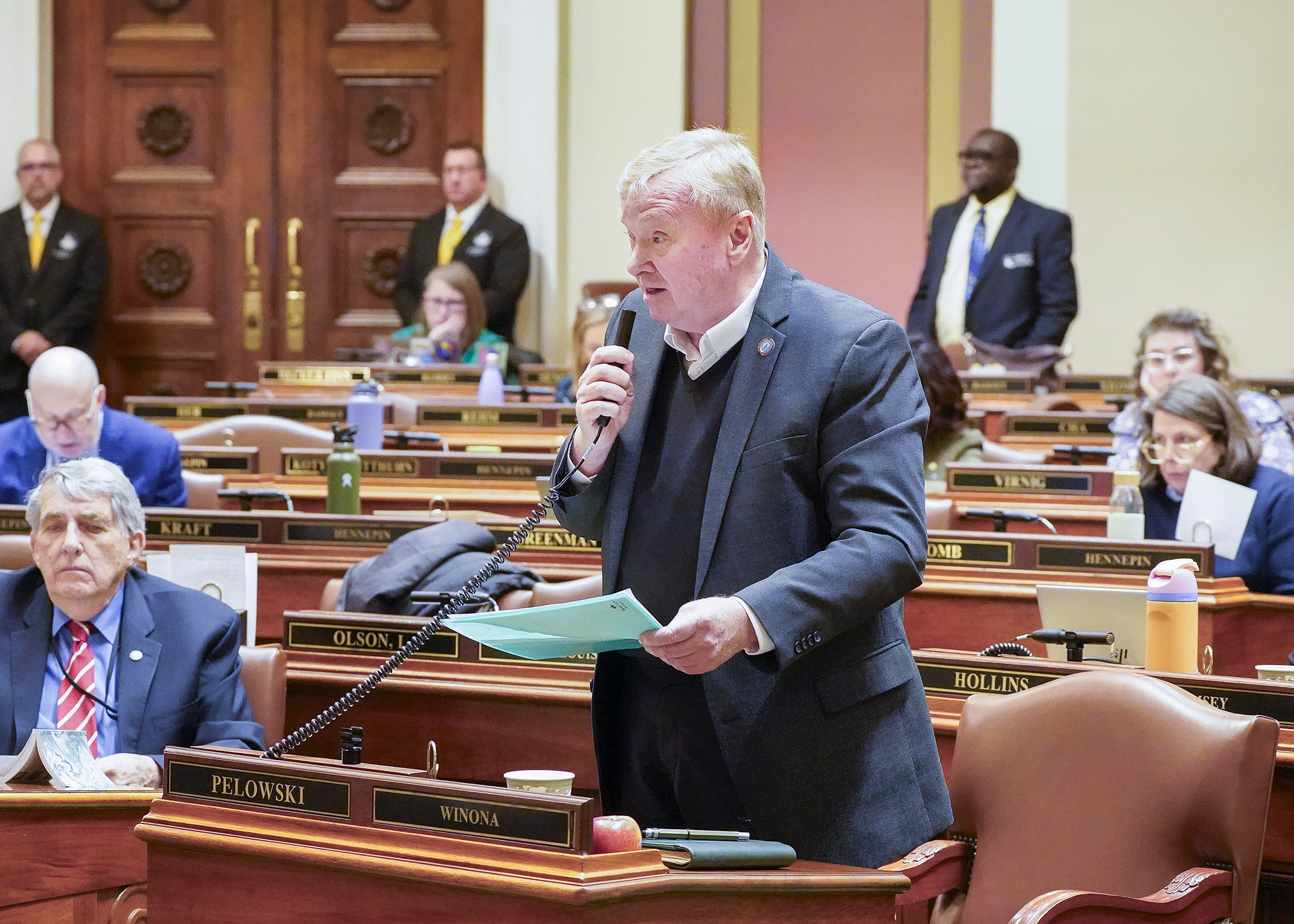Higher education policy bill gets high marks in House

If Minnesota’s 2023 higher education law was the biggest budget bang that public colleges and universities and student scholarship programs had ever seen, then you could call the 2024 bill more of a collection of tweaks and adjustments to that landmark legislation.
And House members found those relatively minor changes acceptable enough to pass the higher education policy bill, as amended, by a 100-32 vote Thursday. The bill is now on its way to the Senate.
Sponsored by Rep. Gene Pelowski, Jr. (DFL-Winona), HF4024 contains 48 proposed policy changes, most of them recommendations from the Office of Higher Education for clarifications and adjustments dealing with the scholarships and grants it oversees. There are also updates to the agency’s sexual harassment and violence policy and how it regulates private career schools.
“Remember that the changes in this bill come about, in part, because we are now seeing an increase in enrollment across our systems after a decade of decline,” Pelowski said. “And that’s exclusively due to the legislation we passed in 2023.”
“We are showing that we in the Legislature have our students’ backs,” said Rep. Nathan Coulter (DFL-Bloomington), a sentiment shared by Rep. Marion Rarick (R-Maple Lake).
“It supports all kinds of people as they’re trying to navigate going into higher education,” she said. “We’re taking care of some people who need taking care of.”
Among other items, the bill would significantly revise requirements on how public colleges make accommodations for students with disabilities, incorporating the text of the RISE Act sponsored by Rep. Jessica Hanson (DFL-Burnsville), and creating requirements for how public colleges and universities contract with online program management companies.
But one item in the bill has proven more controversial than any other. The Fostering Independence grant program for current and former foster children has proven so popular that it’s facing a $5 million budget shortfall. The bill would allow the Office of Higher Education to change the program’s application process to a first-come, first-served basis and to create a waiting list for the scholarships.
Rep. Kristin Robbins (R-Maple Grove) unsuccessfully proposed an amendment to add $6 million to the program’s appropriation for fiscal year 2025. Pelowski said it would be more appropriate for the higher education committee’s upcoming supplemental budget bill, an argument he also made against an unsuccessful amendment from Rarick that would alter funding for the University of Minnesota Medical School’s CentraCare Health System Campus in St. Cloud.
The bill would also:
- add an academic progress requirement to the American Indian Scholars program;
- codify the state’s transcript access law;
- require schools to designate an employee as a “navigator” to assist parenting and pregnant students and create protections for those students at public colleges and universities;
- make tribal colleges eligible for inclusive higher education grants;
- clarify eligibility criteria for free and reduced-price school meals in summer academic enrichment programs;
- require ordering students’ financial aid awards to provide the greatest amount of aid to students;
- provide clarifications for the North Star Promise scholarship program;
- clarify conditions in the SELF loan program;
- add a definition of “physical presence” to the Minnesota Private and Out-of-State Public Postsecondary Education Act and the Private Career School Act and amend licensure language in the latter;
- add “energy” to the programs eligible for workforce development scholarships; and
- change the specific purposes for which a 2023 appropriation may be used for the University of Minnesota Medical School’s CentraCare Health System Campus in St. Cloud.
Rarick sponsored the lone successful amendment, which would change the beneficiary of the latter appropriation from a “scholarship endowment fund” to a “scholarship program.”
Rep. Isaac Schultz (R-Elmdale Township) unsuccessfully offered an amendment that would have inserted a requirement for recipients of North Star Promise scholarships to be “legally residing or lawfully present in Minnesota for federal immigration purposes.”
Related Articles
Search Session Daily
Advanced Search OptionsPriority Dailies
Ways and Means Committee OKs House budget resolution
By Mike Cook Total net General Fund expenditures in the 2026-27 biennium will not exceed a hair less than $66.62 billion.
That is the budget resolution approved Tuesday by the House Ways...
Total net General Fund expenditures in the 2026-27 biennium will not exceed a hair less than $66.62 billion.
That is the budget resolution approved Tuesday by the House Ways...
Minnesota's budget outlook worsens in both near, long term
By Rob Hubbard It looks as if those calling for less state spending could get their wish, judging from Thursday’s release of the February 2025 Budget and Economic Forecast.
A state su...
It looks as if those calling for less state spending could get their wish, judging from Thursday’s release of the February 2025 Budget and Economic Forecast.
A state su...